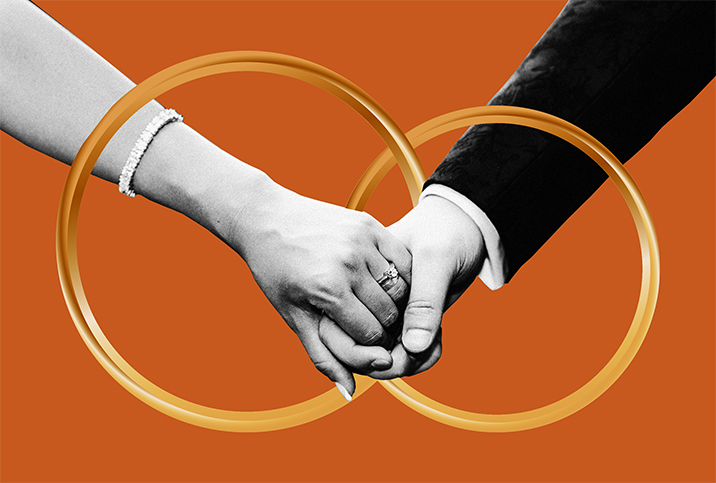Engaged to Be Married? Now's the Time for Premarital Counseling

Runaway brides, grooms in cold sweats and wildly dysfunctional, so-called supportive families are entertaining fodder for TV and movies, but such situations aren't much fun in real life. It may seem a little early for this kind of help, but premarital counseling aims to preempt and resolve conflicts while equipping couples with the tools they need to make it over the long haul.
Many married couples seek counseling when one or both parties are at the end of their tether—research tells us that's after 2.68 years of conflict on average. And by that point, one foot may already be out the door.
But differences and disagreements often arise long before a couple is even engaged to be married, and the wedding planning process can make those issues even more conspicuous.
"Disagreements around wedding planning are extremely common, if not an essential part of the engagement process," explained Jodie Milton, co-founder of Practical Intimacy, an online relationship and intimacy coaching practice based in Queensland, Australia. "It's actually a great time to practice working as a team on a big project, collaborating around your own wants and needs, and learning how to balance the mental load of shared responsibilities. It can also be a time when insecurities and fears about the relationship and the concept of marriage itself come to the surface. It can be upsetting to have doubts about your relationship during your engagement period, but it's actually a normal part of the process. Rather than seeing it as a bad thing, embrace it as an opportunity to have important conversations that will strengthen both your relationship and your sense of self."
Enter premarital counseling, which can facilitate productive conversations in a safe space and lay the groundwork for a stable, lasting union.
"Premarital counseling is designed to support a couple on the journey into marriage and prepare them for a fulfilling life together," Milton said. "It can be a combination of working through specific questions or concerns in the relationship while also learning valuable skills to help ensure the health of your relationship into the future."
How does premarital counseling work?
Milton said premarital counseling varies depending on the counselor and your needs and preferences. You might opt for six to 10 weeks of weekly sessions, or three to six months of sessions with more time between, though most experts say the sooner you start, the better. James Miller, a psychotherapist in Miami and host and executive producer of "Lifeology Radio," suggested maintaining a relationship with a counselor and scheduling annual or biannual check-ins after tying the knot.
There are different techniques—including the Gottman Method, emotionally focused therapy (EFT) and psychodynamic therapy—all of which can be effective. Typically, clinicians begin by taking in-depth questionnaires to understand the individuals and couple. Then they often discuss important events and experiences that have affected each individual and the relationship before delving into deep discussions about various topics.
"We focus on offering key skills and mindsets around topics like sex, parenting, managing the household load, maintaining friendship and connection, and how to prioritize your sense of self within your marriage," said Milton, who practices the Gottman Method. "You can expect to have many deep, truthful, enlightening conversations with your partner with the support of an expert, and to experience some simple, fun ways to connect more deeply. It can be challenging, emotional, playful and fun all in the same session."
According to the experts, there are two important questions you should think about:
What can premarital counseling help with?
- Boosting confidence. It's normal to feel some doubt and apprehension, especially if your parents had an imperfect union or you've previously been unlucky in love. A counselor can facilitate open, honest discussions to help couples feel more assured and optimistic about their future, and enhance their ability to handle whatever challenges might come.
- Improving intimacy and sex. Intimacy and sex encompass a variety of physical and psychological elements and mean different things to different people. But experts agree these are two of the most crucial aspects of a happy and healthy relationship, and many couples struggle with them. A counselor can help people connect more deeply and keep the spark alive.
- Learning to communicate. Communication—or lack thereof—is by far one of the most common reasons people seek help, experts said. Cheryl Fraser, Ph.D., a psychologist and sex therapist based in British Columbia, Canada, said whether it's deciding where to live or how frequently to have sex, couples can find a safe space with a counselor to express themselves, hear each other and have tough conversations with productive results. "You'll learn important relationship skills, such as how to navigate conflict in a healthy, empowering way, how to manage the imbalance of sexual desire in your sex life, how to maintain emotional intimacy and connection during challenging times, and how to talk openly about your feelings and thoughts, while supporting your partner to do the same," Milton explained.
- Learning to fight fair. Gilza Fort-Martínez, M.S., L.M.F.T., a couples and family therapist and CEO and founder of Resolution Counseling Center in Glenvar Heights, Florida, said some conflict is normal in any relationship and counseling can help couples learn to argue productively. "I really worry a lot about couples that tell me they never fight because how much are you accommodating for? How much are you not saying?" she said. "All conflict is a difference of opinion. It's what we do with those differences of opinion that make things better or worse."
- Transitioning from singlehood. Premarital counseling can help individuals learn to respect their marriage and partner's needs while preserving individuality and autonomy.
- Understanding attachment styles. Attachment styles—people's behaviors and patterns in relationships—are formed in childhood and can have a significant impact on life. Miller explained that people with secure attachment styles tend to be, well, secure in their relationships. People with anxious or fearful-avoidant attachment styles struggle with trust. A premarital counselor can help couples understand each other's attachment styles and assuage insecurities.
What are some important (but difficult) discussions couples should have before tying the knot?
- Goals and dreams. Couples don't have to share all the same dreams and goals, but it is essential to ensure those that differ are compatible. For instance, if one spouse aspires to run their own company in New York City, it might be challenging to reconcile that with a partner who envisions living a quiet farm life in Montana. "I encourage them to have conversations about their dreams, where they see themselves as a person as well as themselves within a couple in five years, 10 years [and] 30 years," Fort-Martínez said. "Then I encourage them to talk about those dreams in relation to goals, the idea being for them to hear out loud where the other person is at and see how much of it truly aligns."
- Finances. Like monogamy, money can be a contentious topic. "I've worked with many people who want to have these commingling finances and others who do not, so that can cause issues and rifts as well," Miller said. Milton and Miller advised working with your counselor to examine your joint financial situation and discuss how you'll manage money as a married couple.
- Kids. Do you want children, and if so, how many? Consider how you'd raise them as well, including specific religious or spiritual beliefs, parenting styles and responsibilities. It could be a problem if one partner wants five kids and another wants one, for instance, or if one party sees themselves as a stay-at-home parent and the other doesn't want to be the sole breadwinner.
- Relationship style. It might seem obvious, but before making a lifelong commitment to another person, it's important to make sure you both want the same kind of commitment, i.e., monogamous, polyamorous or ethically nonmonogamous. Miller said he has worked with multiple couples who didn't address this before getting hitched. Eventually, these unfulfilled—and often unexpressed—desires can lead to conflict.
- Sex, sensuality and intimacy. In her practice, Fraser uses a model called the "passion triangle," consisting of intimacy, thrill and sensuality. To her, intimacy entails components such as emotional closeness, communication, conflict management, trust and mutual support. Thrill indicates excitement, the "in love" feeling. And sensuality can encompass everything from holding hands to BDSM sex. Although all are equally important, Fraser said intimacy is the bedrock and the facet she prioritizes with her clients. "Sex and sensuality don't happen in a vacuum…but a lot of times we act as though it does," she said. She explained that if couples feel emotionally distant or can't communicate effectively, they'll likely feel the effects in the bedroom. Unfortunately, many people have difficulty bringing up even minor issues constructively. Discussing needs and desires related to intimacy and sex can feel formidable. Counseling provides a safe space for couples to discuss needs, wants and concerns. It also provides the necessary skills to keep the spark alive amid hectic schedules, changing bodies and waning libidos.
How to suggest premarital counseling
It can be tough to broach the topic of premarital counseling, mainly because many people assume that seeking help means something's wrong, but also because of the stigma around asking for help for your mental health. Miller and Milton suggested working around this by framing counseling as a way to celebrate and fortify the relationship rather than a means to address issues.
"Help your partner see that working on your relationship is actually a sign of strength and commitment in your relationship and sets you up for an exceptional marriage," Milton said.
Fraser agreed, saying seeking guidance is "an incredible act of love" that demonstrates respect for the value of the relationship.
"It moves us out of what I'm going to call—perhaps a little unkindly—an immature view that relationships, if they're right, they're easy," she said. "Everything's going to fall into place. It's going to be like a Jennifer Aniston movie. It's going to be like porn or romance fiction, or both. It's really naive. It's sentimental. And it's dead wrong."
Like anything else, from gardening to parenting, Fraser said fostering a healthy, happy long-term relationship requires skills, training and knowledge.
"Not only is that not weird or wrong, but it also shows, 'Damn, you matter to me, our relationship matters to me and I want to be exceptional,'" Fraser said.


















